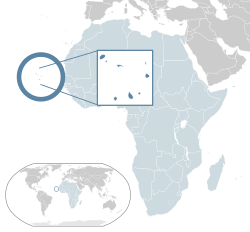
Back Кабо-Верде Abkhazian Kaap Verde Afrikaans Kap Verde ALS ካቦ ቨርዴ Amharic Cabo Verde AN Grēnenæs Īega ANG केप वर्डे ANP الرأس الأخضر Arabic الراس لخضر ARY كابو فيردا ARZ
Republic of Cabo Verde | |
|---|---|
Motto:
| |
| Anthem: Cântico da Liberdade (Portuguese) (English: "Chant of Freedom") | |
| Capital and largest city | Praia 14°55′N 23°31′W / 14.917°N 23.517°W |
| Official languages | Portuguese |
| Recognised national languages | Cape Verdean Creole |
| Religion |
|
| Demonym(s) | Cape Verdean or Cabo Verdean[2] |
| Government | Unitary semi-presidential republic[3] |
| José Maria Neves | |
| Ulisses Correia e Silva | |
| Legislature | National Assembly |
| Formation | |
• Independence from Portugal | 5 July 1975 |
| 13 January 1990 | |
| Area | |
• Total | 4,033 km2 (1,557 sq mi) (166th) |
• Water (%) | negligible |
| Population | |
• 2021 estimate | 587,925[4][5] (172nd) |
• Density | 123.7/km2 (320.4/sq mi) (89th) |
| GDP (PPP) | 2019 estimate |
• Total | $4.323 billion |
• Per capita | $7,728[6] |
| GDP (nominal) | 2019 estimate |
• Total | $2.042 billion |
• Per capita | $3,651[6] |
| Gini (2008) | 47.2[7] high |
| HDI (2019) | medium · 126th |
| Currency | Cape Verdean escudo (CVE) |
| Time zone | UTC–1 (CVT) |
• Summer (DST) | UTC–1 (not observed) |
| Driving side | right |
| Calling code | +238 |
| ISO 3166 code | CV |
| Internet TLD | .cv |
Cape Verde (/ˈvɜːrd(i)/ (![]() listen)) or Cabo Verde (/ˌkɑːboʊ ˈvɜːrdeɪ/ (
listen)) or Cabo Verde (/ˌkɑːboʊ ˈvɜːrdeɪ/ (![]() listen), /ˌkæb-/) (Portuguese: Cabo Verde, pronounced: [ˈkabu ˈveɾdɨ]), officially the Republic of Cabo Verde,[10] is an island country in Africa. It is a group of islands in the Atlantic Ocean, 570 km (354 mi) off the coast of Western Africa. The islands cover a combined area of slightly over 4,000 km2 (1,500 sq mi). They have a volcanic origin.
listen), /ˌkæb-/) (Portuguese: Cabo Verde, pronounced: [ˈkabu ˈveɾdɨ]), officially the Republic of Cabo Verde,[10] is an island country in Africa. It is a group of islands in the Atlantic Ocean, 570 km (354 mi) off the coast of Western Africa. The islands cover a combined area of slightly over 4,000 km2 (1,500 sq mi). They have a volcanic origin.
Cape Verde is one of Macaronesia's group of islands.
- ↑ "Cabo Verde - Religion | Britannica".
- ↑ John Kerry (8 July 2014). "On the Occasion of the Republic of Cabo Verde's National Day". U.S. Department of State. Retrieved 11 July 2014.
On behalf of President Obama and the people of the United States, I send best wishes to Cabo Verdeans as you celebrate 39 years of independence on July 5.
- ↑ Neto, Octávio Amorim; Lobo, Marina Costa (2010). "Between Constitutional Diffusion and Local Politics: Semi-Presidentialism in Portuguese-Speaking Countries". Social Science Research Network. SSRN 1644026.
{{cite journal}}: Cite journal requires|journal=(help) - ↑ "World Population Prospects 2022". population.un.org. United Nations Department of Economic and Social Affairs, Population Division. Retrieved July 17, 2022.
- ↑ "World Population Prospects 2022: Demographic indicators by region, subregion and country, annually for 1950-2100" (XSLX). population.un.org ("Total Population, as of 1 July (thousands)"). United Nations Department of Economic and Social Affairs, Population Division. Retrieved July 17, 2022.
- ↑ 6.0 6.1 "Report for Selected Countries and Subjects". www.imf.org.
- ↑ "GINI index". World Bank. Archived from the original on 20 December 2013. Retrieved 26 July 2013.
- ↑ Human Development Report 2020 The Next Frontier: Human Development and the Anthropocene (PDF). United Nations Development Programme. 15 December 2020. pp. 343–346. ISBN 978-92-1-126442-5. Retrieved 16 December 2020.
- ↑ "People and Society – Cape Verde". Archived from the original on 15 January 2014. Retrieved 27 August 2017.
- ↑ Tanya Basu (12 December 2013). "Cape Verde Gets New Name: 5 Things to Know About How Maps Change". National Geographic. Archived from the original on 13 December 2013. Retrieved 12 December 2013.
© MMXXIII Rich X Search. We shall prevail. All rights reserved. Rich X Search



